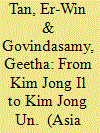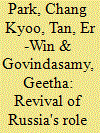|
|
|
Sort Order |
|
|
|
Items / Page
|
|
|
|
|
|
|
| Srl | Item |
| 1 |
ID:
116680


|
|
|
|
|
| Publication |
2012.
|
| Summary/Abstract |
The recent death of Kim Jong Il and the succession of his son, Kim Jong Un, as Supreme Leader of the Democratic People's Republic of Korea leaves the Northeast Asian region at a crossroads. Given the younger Kim's lack of political experience, it is reasonable to believe that his priority will be on consolidation of his political and military power base in Pyongyang. More recently, the Democratic People's Republic of Korea (DPRK) has sent mixed signals with regard to its intentions. On the one hand, North Korea has agreed to a moratorium of its nuclear activities and has even invited the IAEA to inspect its nuclear facilities; at the same time, however, the DPRK has also announced its plan to launch a satellite in mid-April, using technology derived from the Taepodong missile. Set against this backdrop, we underline and comparatively assess the importance of the USA, the Republic of Korea, and China, all of which will be going through a political transition in 2012. We conclude that Seoul and Beijing are in the best position to reopen the process of dialogue with the DPRK.
|
|
|
|
|
|
|
|
|
|
|
|
|
|
|
|
| 2 |
ID:
145007


|
|
|
|
|
| Summary/Abstract |
There are regional fears that Beijing will use its growing clout to embark on an aggressive, expansionist policy in International Relations, hence the possibility of a collision course with the USA reminiscent of how Anglo-German tensions at the beginning of the twentieth century escalated into World War One. Closer scrutiny, however, suggests grounds for downplaying the likelihood of such a scenario. We outline this argument based on the following points: (i) there is a much higher level of economic interdependence between China and the USA today, compared to Britain and Germany, (ii) the corresponding levels of nationalism in China and the USA are lower than in Britain and Germany, (iii) the political alignments of international relations in the Asia Pacific in 2014 are less ambiguous than those in Europe in 1914, hence less potential for diplomatic miscalculation and (iv) the military and economic instruments of power that the USA and China possess, by being far more lethal than those held by Britain and Germany in 1914, would render any conflict between them an unacceptably costly catastrophe.
|
|
|
|
|
|
|
|
|
|
|
|
|
|
|
|
| 3 |
ID:
152127


|
|
|
|
|
| Summary/Abstract |
The process of engaging the Democratic People’s Republic of Korea stands at a crossroads that presents challenges as well as opportunities. We believe that the Association of Southeast Asian Nations (ASEAN) can indirectly help to facilitate North Korean reforms in three ways: (i) Political: via ASEAN’s ability to function as a neutral facilitator of dialogue; (ii) Economic: as models of economic reform for North Korea (particularly based on the experiences of Singapore and Vietnam); (iii) Social: the Choson Exchange based in Singapore is an ideal location for enabling North Koreans to study abroad and thus gain a greater understanding of other countries.
|
|
|
|
|
|
|
|
|
|
|
|
|
|
|
|
| 4 |
ID:
118418


|
|
|
|
|
| Publication |
2013.
|
| Summary/Abstract |
The death of North Korean leader Kim Jong-il in 2011 presents Russian president Vladimir Putin with an opportunity to regain influence on the Korean peninsula. Over the long term, Russia may reemerge as a great power in the Asia Pacific region in line with Russian geostrategic interests. Since the collapse of the Soviet Union, Russia has been marginalized on major issues in Northeast Asia. The prospect of a consistent, long-term North Korea policy under Putin places Moscow in a strong position to sustain the process of engagement with North Korea. More significantly, it serves Moscow's demographic, economic, and security interests to be a positive influence in the region in order to regain a diplomatic role in any security initiatives concerning the Korean peninsula. In this article, we argue that if and when the Russian Far East is developed, Moscow would be in a position to offset the regional strategic and economic dominance of the United States and China.
|
|
|
|
|
|
|
|
|
|
|
|
|
|
|
|
| 5 |
ID:
187974


|
|
|
|
|
| Summary/Abstract |
This article examines the realpolitik calculations behind China’s responses to General Min Aung Hlaing’s February 2021 coup d’etat in Myanmar. By seeking to play both sides of the unrest in Myanmar, Beijing hopes to ensure that it can count on a set of regional allies to serve China’s interests. By simultaneously strengthening friendly relations with the Tatmadaw regime and the ethnic minority communities and pro-reformist movements in the country, Beijing can maintain a façade of friendship with the junta, while concurrently strengthening Beijing’s influence over Myanmar’s internal political forces. This enables Beijing to signal that it would be unwise for the Tatmadaw to step out of line away from China’s interests.
|
|
|
|
|
|
|
|
|
|
|
|
|
|
|
|
| 6 |
ID:
165778


|
|
|
|
|
| Summary/Abstract |
Article Type: Research Paper Purpose—As an authoritarian country that exercises rigid censorship, North Korea presents significant challenges to data-gathering for research in international relations. This paper aims to outline how source triangulation can help to overcome some of these challenges. Design, Methodology, Approach—This study draws on the author's observations of academic scholarship on North Korea that has been undertaken through the use of source triangulation. This study examines chronological data triangulation, perspectives-based data triangulation, and methodological triangulation as means of analyzing trends in the study of North Korea. Findings—Proper application of source triangulation as an instrument of research can enable scholars to find ways to circumvent some of the challenges in gathering data on North Korea. Although the author emphasizes that source triangulation should not be seen as a panacea, it does provide scholars with possible alternative lines of research inquiry. Practical Implications—Other scholars may find this text useful in planning their research strategy in undertaking scholarship on North Korea. Originality, Value—This paper builds on work by other North Korea scholars as well as the author's own experience in applying source triangulation as an instrument of social science research.
|
|
|
|
|
|
|
|
|
|
|
|
|
|
|
|
|
|
|
|
|